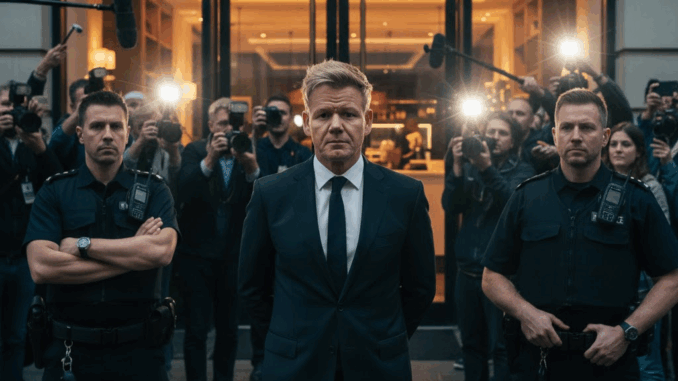
When people think of Gordon Ramsay, they imagine chaos — shouting, fire, and impossible standards. But what most fans don’t realize is that behind his fierce persona lies a man who has stared into the darkest corners of the culinary world. Years ago, Ramsay didn’t just cook — he investigated. And what he uncovered shook him to his core.
In his hard-hitting documentary, “Gordon Ramsay on Cocaine,” the world-famous chef did something no one expected: he stepped away from the heat of the kitchen to expose the heat of a deadly truth — the rampant drug problem infecting the restaurant industry. It wasn’t scripted TV. It wasn’t entertainment. It was a real look at what happens behind closed doors, where white powder sometimes flows as freely as flour.
“I wanted to see it for myself,” Ramsay said in the film, his voice heavy with disbelief. “Because if it’s happening in my kitchens — I need to know.”
And it was.
Ramsay discovered that drug use wasn’t just a dirty secret — it was part of the culture. Cocaine, he learned, had become a toxic fuel that some chefs and staff used to survive long, brutal shifts. “They’re not taking it for fun,” he explained. “They’re taking it just to stay awake. That’s how bad it’s gotten.”
The documentary followed Ramsay as he confronted the reality most restaurant owners refuse to talk about. From the bustling nightlife of London to the chaotic prep rooms of fine-dining establishments, cameras captured moments that felt like something out of a crime thriller — except it was real. Ramsay even sent samples from his own restaurants for testing. The results left him stunned: traces of cocaine were found in nearly every single bathroom, including his flagship Michelin-starred venues.
“I was disgusted,” Ramsay admitted. “I couldn’t believe it. My own restaurants. My own team. I felt like I’d failed them somehow.”
The revelation forced him to question everything — his management, the pressure-cooker culture of the industry, and the impossible expectations that push young chefs to the brink. Ramsay’s investigation exposed how substance abuse had become a coping mechanism in kitchens where exhaustion, competition, and adrenaline mix like volatile ingredients.
But the most haunting moment came when Ramsay confronted the memory of a close friend — a talented chef whose life ended because of addiction. “He was one of the best,” Ramsay said quietly, his voice cracking. “But cocaine destroyed him. And I still feel guilty that I didn’t see the signs sooner.”
That loss, he revealed, was one of the main reasons he made the documentary. “It wasn’t about ratings,” he said. “It was personal. I wanted to understand why this keeps happening — and what we can do to stop it.”
The film sparked outrage, empathy, and conversation across the industry. Viewers praised Ramsay for daring to address a taboo that so many chefs silently endure. “He showed the truth that nobody wants to admit,” one critic wrote. “That the restaurant industry doesn’t just burn people out — it chews them up.”
The shocking documentary also prompted real change. Ramsay began implementing new wellness and mental health programs across his global restaurant group. He encouraged open conversations about stress, substance abuse, and emotional burnout — topics once seen as signs of weakness in the high-pressure culinary world. “We’ve created this monster,” he said bluntly. “And now it’s time to fix it.”
Even more surprising was how vulnerable Ramsay allowed himself to be on camera. Gone was the fiery TV persona. In his place stood a man clearly wrestling with guilt and determination — a leader who wanted to protect the very people he once pushed to their limits.
“You can’t demand perfection without offering support,” he said in a moment that silenced viewers. “You can’t expect people to perform at their best when they’re dying inside.”
The documentary forced other celebrity chefs and restaurant owners to take a hard look at their own teams. It even prompted investigations across London’s top kitchens, where hidden drug cultures were suddenly dragged into the light. “If Gordon Ramsay — of all people — admits it’s in his restaurants, then no one is immune,” one insider told The Guardian.

For Ramsay, the experience changed everything. “It opened my eyes,” he later confessed. “I realized I’d been part of the problem without knowing it. The pressure, the shouting — it all adds up. People crack.”
Since then, Ramsay has quietly worked to reshape his empire from the inside out. Beyond creating world-class dishes, he’s become an advocate for healthier kitchen cultures — emphasizing rest, balance, and respect over relentless intensity. “It’s not weakness to ask for help,” he said. “It’s survival.”
Fans who once knew him only as the “angry chef” now see a man with purpose — one who’s not afraid to face uncomfortable truths, even when they hit close to home. His courage to expose the underbelly of his own industry made him something more than a TV icon: he became a voice for those too afraid to speak.
“I’ll always be tough in the kitchen,” Ramsay said with a small smile, “but I’ll never ignore what’s happening around me again. We’ve lost too many good chefs already.”
And that’s the part that resonates most. Gordon Ramsay, the man known for perfection and fire, looked into the darkness and refused to turn away. He didn’t just reveal the problem — he started the conversation that might save lives.
Because at the end of the day, behind every plate of food and every Michelin star, there’s a human being — exhausted, hopeful, and sometimes barely holding on. And if Gordon Ramsay has his way, that truth will never be hidden again.